We are going to analize the controversial topic of Social Punishment (SP). While SP can have a role, our goal is to highlight in which cases this tool can do more harm than good, especially when dealing with CDM (Civil Disobedience Movement) and Soldiers defections. We consider CDM the central pillar of this Revolution, and Military defection as the preferable way to weaken the Tatmadaw. But Unity is just as important. A Revolution can’t be successful without a wide and united front. Understanding when SP creates unnecessary divisions is important. When this happens, we have to consider alternative ways to make our movement wider and stronger.
When recruiting people for the revolution, if we set the bar too high, we will have a movement made of only heroes, but lacking numbers. And a more divided society. Realistically, we need to find strength in numbers, while making it easier for regular people to become heroes.
When at the end of march an interview by french journalist Guillaume Pajot to a Tatmadaw Captain highlighted that SP is harming the Revolution, we tried to explore how Social Punishment is effecting the whole CDM.
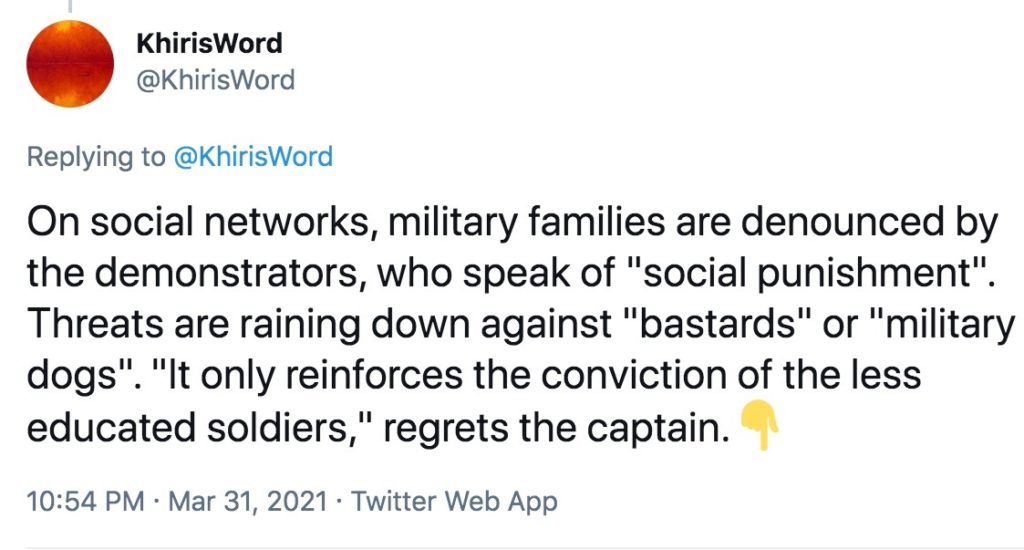
When speaking about non CDM workers we can distinguish two groups:
- Green group: Pro-military workers and/or the ones seek benefit from not joining CDM (promotions)
- Red group: Anti-coup workers who perceive the “cost” of joining CDM too high (safety and financial concerns)
Some may dismiss people in the “Red Group” and call them “traitors”, “Gen Lee” or disrespectful to CDMers. For sure there are many incredibly brave people who give up everything and risk their lives everyday, but there is a reason why we celebrate them as heroes (or martyrs): it’s an extreme act of braveness that most common people would not do. The truth is that most human beings think about their own survival first, it is a natural instinct.
People’s personalities are different. Some are risk adverse and they just “happened” to be working in a key sector in this particular time. On top of that, some people feel a stronger obligation to a primary group (i.e. family, children) rather than to a secondary group or an ideal (Myanmar as a nation/democracy). They have a lower risk tolerance than others. For them joining CDM has to be safe enough to be considered.
Social Punishment is one of the tools that social groups can use to discourage uncooperative behaviour. But does it really work in this case?
In Myanmar there is in an intergroup conflict, and SP is available to both competing groups (Tatmadaw vs the Spring Revolution). The Tatmadaw’s SP is far harsher than any punishment civilians could apply (which is basically social exclusion), making the latter a far more acceptable price to pay.
Early CDMers who are now going back to work, surely don’t belong to the “Green group”. They have been living under constant pressure by the SAC (State Administration Council) and financial problems, and they are finally perceiving staying in the CDM too risky to continue.
In this situation SP may not be as beneficial as some think. People living CDM know very well the consequences. On the contrary SP can create more divisions in communities and groups that we need to stay united (i.e. intra-family divisions). The risk is to disengage people who are against the coup, but prefer to fight in different forms.
People contribute to this fight in various ways. Some protest on the streets, some in front of a keyboard. Some donate, some volunteer. Difference in forms is dictated by personality, resources and personal context. Government workers are in a “lose-lose situation” and some perceive it as unfair. While most people can choose how to protest the coup, government workers have no choice. Alienating them or pushing them into a neutral or even opposite stance is not beneficial for our movement. After all “survival” is the final form of resistance and our revolution is based on strength in numbers.
But CDM is one of the pillars of our Revolution. What should we do?
If physical and financial safety is the main concern for most potential CDMers, lowering the risk factor can be very effective, and can make their choice easier. Many CDMers are not receiving any salary since early march. On this NUG has to step up its game. After 3 months of resistance, announcing that salaries will be paid “every three months” is surely not going to help. And there is no mention of providing more physical protection. Not easy, but these would be game changers.
from Myanmar Now:
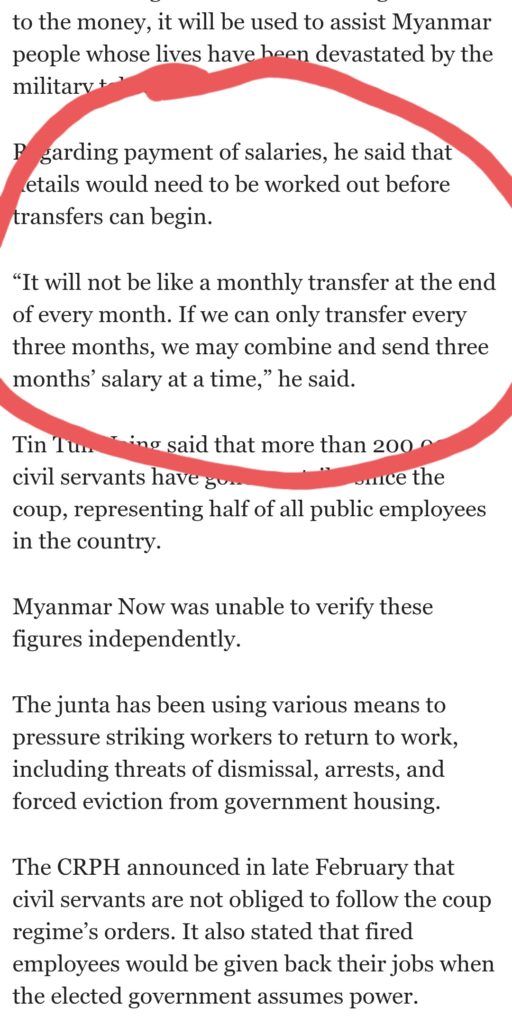
We have various friends who are government workers, and we have seen different approaches.
The hardcore CDMer, loyal to the cause despite not receiving salary since early march
The early CDMer who is going back to work and is thinking about resigning (proof that this is an impossible dilemma to solve for many)
The worker who did join CDM after weeks of thinking, because he feels he/she has to provide for its family and young children first. He/she’s not pro-military, but he/she prioritizes his primary group.
The one took holidays until now and has yet to decide what to do.
SP was not a factor for any these choices.
Phrases we’ve been told:
“some people protested on the streets, but when shootings started, most stopped protesting. They stay home and nobody will criticise them. But government workers have nowhere to hide. I am afraid for my safety and people hate me”
“People don’t even bang pots at 8pm anymore, they turn the lights off and stay quiet. When military comes in our ward, they don’t bang pots. They say CDM are heroes, but if police comes to arrest me, nobody will defend me”
“normal people can go to work, they go on with their lives and try to survive, but I can’t do my job”
“On FB in the group chat, someone said that the safety of the people who don’t join CDM cannot be guaranteed”
“my brother doesn’t speak to me anymore because he wants me to join CDM”
“I join CDM for the future of my children, even if I get arrested I don’t want them to live under the dictatorship”
“I am going to resign, so people would stop expecting me to do anything”
Government workers right now are receiving threats both from SAC (arrest, loss of job and housing…) and democratic forces (social exclusion, harassment, house burning…). They are in a lose-lose situation, an impossible position that forces them into a self-defence mode rather than a more daring one. We can now see divisions within families and between long time friends, and division is what makes the Tatmadaw stronger.
SOLDIERS
The same logic can be applied to military defections. The soldiers who joined CDM pointed out that around 70% of them are against the coup. The reason why many of them did not defect yet, is that they fear for their own safety.
Most soldiers are not free, they are literally isolated. Their families live in military compounds and are strictly surveilled. Defections come at a very high cost for them.
In this case younger single soldiers with no family and who are closer to EAO’s controlled areas, surely have an easier choice than their colleagues working in central Burma.
If the goal is seeking more defections, SP may not be useful because:
- The military propaganda paints protesters as “terrorists” or “traitors”. Attacking the military with SP may reinforce the idea that protesters want to destroy the military and the country.
- SP by the Tatmadaw is much worse than SP by the revolutionary movement
- Soldiers may think they will be punished by the revolutionary movement (and SAC) once they defect.
- Soldiers may see divisions in our movement, and feel we are not strong and united enough to win
- Soldiers may not listen to enemies, but they may listen to their loved ones, their own families. Social punishing families of soldiers who want to defect is burning these very thin bridges of communication. Most communications between CRPH/CDM and Tatmadaw soldiers actually go through their families, this is why the Tatmadaw is trying to isolate them.
While we still have to fight against them, if we want them to defect, the message should be that simple soldiers are not our target. Generals are. After all we have more in common with soldiers than we think: we are all victims of the generals who are oppressing and enslaving us. And isolating the generals, while widening the opposition is only going to help the Revolution.
To achieve this we need to create division, just like the Tatmadaw did with Myanmar people for 70 years. Treating generals and soldiers the same way, would only unite them in solidarity and give them strength (just like the coup united most Myanmar ethnic groups and classes). The generals actually love social punishment as it helps their cause, reinforcing the “us vs them mentality”.
Finally, none of the soldiers who defected cited SP as a factor of his/her decision. Their own safety and the safety of their families is the key factor.
Conclusion:
SP has a role in discouraging “unwanted” behaviours, but should be targeted just like economic sanctions, otherwise it may bring more harm than benefits. In an intergroup conflict in which the Tatmadaw has a much harsher SP than the revolutionary movement, alternatives have to be considered. While the best approach to the CDM dilemma is far from definitive, incentivising CDM by making hard choices easier and offering a safe haven for workers/soldiers, might be a better solution.
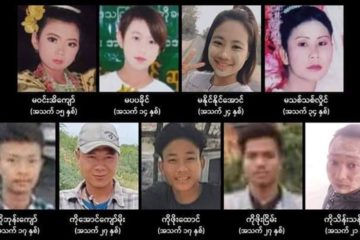
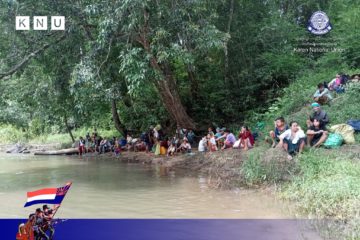
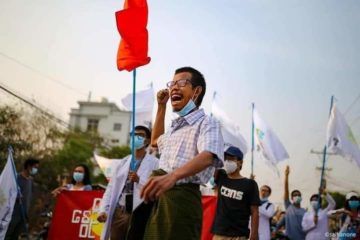
0 Comments